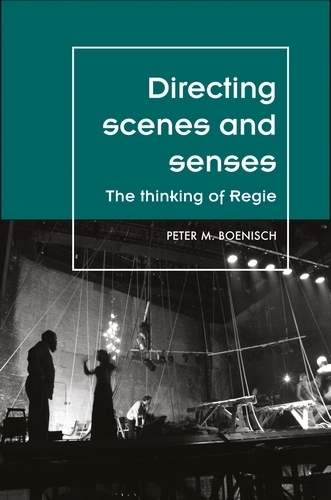
Directing Scenes and Senses: The Thinking of Regie
(Paperback)
Available Formats
Publishing Details
Directing Scenes and Senses: The Thinking of Regie
By (Author) Peter Boenisch
Manchester University Press
Manchester University Press
16th August 2017
United Kingdom
Classifications
Physical Properties
Paperback
224
Width 156mm, Height 234mm
Description
As European theatre directors become a familiar presence on international stages and a new generation of theatre makers absorbs their impulses, this study develops fresh perspectives on Regie, the Continental European tradition of staging playtexts. Leaving behind unhelpful cliches that pit, above all, the director against the playwright, Peter M. Boenisch stages playful encounters between Continental theatre and Continental philosophy. The contemporary Regie work of Thomas Ostermeier, Frank Castorf, Ivo van Hove, Guy Cassiers, tg STAN, and others, here meets the works of Friedrich Schiller and Leopold Jessner, Hegelian speculative dialectics, and the critical philosophy of Jacques Ranciere and Slavoj Zizek in order to explore the thinking of Regie - how to think Regie, and how Regie thinks. -- .
Reviews
'We all have difficulty understanding the differences between directing, staging, devising, performing, or between performance and mise en scene. Peter Boenisch's new book on Regie discusses how contemporary theatre-makers engage with plays, materials or events that they want to 'put on stage'. As theatre-goers are themselves more and more expected to 'stage' their own impressions and insights, this is a most timely and necessary book for anyone interested in contemporary European theatre.' -- Patrice Pavis, Professor of Theatre Studies at the University of Kent
"Among the many merits of Peter Boenisch's [Book] is that it throws into relief these longstanding disagreements about the liberties a director should take with a play text. While building a case for why such debates are needed, Boenisch also suggests they tend to be built on a misapprehension, one exemplified by the English understanding of the German word Regietheater. Often translated as 'director's theatre', Boenisch reminds readers that Regietheater actually means something more like 'directing theatre'(p.7). He flags this mistranslation to insist that instead of pitting the 'vision' of directors against the 'intentions' of playwrights, Regie actually indicates an aesthetic practice that mediates text and performance to create something that transcends both (p.73). Directing Scenes and Senses is far from a dispassionate defence of Regietheater, but Boenisch's partiality makes it a compelling contribution..."-Michael Shane Boyle Queen Mary University of London, Contemporary Theatre Review
"
Author Bio
Peter M. Boenisch is Co-Director of the European Theatre Research Network (ETRN) and a Fellow of the International Research Centre 'Interweaving Performance Cultures'
